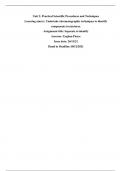Learning aim(s); Undertake chromatographic techniques to identify
components in mixtures.
Assignment title: Separate to identify
Assessor: Eoghan Pierce
Issue date: 26/11/21
Hand in Deadline:10/12/2021
,Introduction
Chromatography is the separation technique which is commonly used to separate or identify
unknown components, or solutes, of a mixture all depending on the idea of the relative amount
of solute distributed between a mobile phase, and a continuous stationary phase. In almost all
techniques of chromatography the stationary phase is either a solid or a liquid. (Giddings, 2020)
The distinct pigments/substances are identified through a calculation which is known as rf
value. To find the rf value of a substance you find the distance travelled by the components and
divide it by the distance travelled by the solvent (Fink, Cline and Fink, 1963)
Distance travelled by pigment
RF VALUE=__________________________________
Distance travelled by the solvent
Different types of chromatography techniques are:
- Paper chromatography
- Column chromatography
- Ion-exchange chromatography
- Thin Layer chromatography
- Gas chromatography
Coskun, 2016)
Along with these there are several different types of chromatography techniques that are used
in different industries and for a variety of reasons which cannot be conducted for example a
school might more likely conduct a paper chromatography due to the range of complexity
compared to a forensic scientist may ustilise gas chromatography. Throughout this report, 3
experiments will be carried out: Paper chromatography of spinach leaves, thin layer
chromatography of spinach leaves and paper chromatography of amino acids. Overall, these
experiments will help us find the most efficient and judge the accuracy of the rf values
compared to research statistics
, Report 1: Paper Chromatography of Spinach
Introduction:
Paper chromatography is a partition principle which is mainly used to separate a variety of
substances or identify unknown substances in analytical chemistry. This is where the filter
paper also known as ‘chromatography’ paper is the stationary phase and where the liquid is the
mobile phase (Clegg, 1950). Paper chromatography relies on the idea of the solvent going
through substances to figure out if the substance being tested is pure or impure.
The experiment carried out solvent, propanone will be the mobile phase and the
chromatography paper will be the stationary phase.
Aim
The whole aim of this experiment was to investigate the different pigments that form green
found in green plants for which in this case was spinach leaves.


